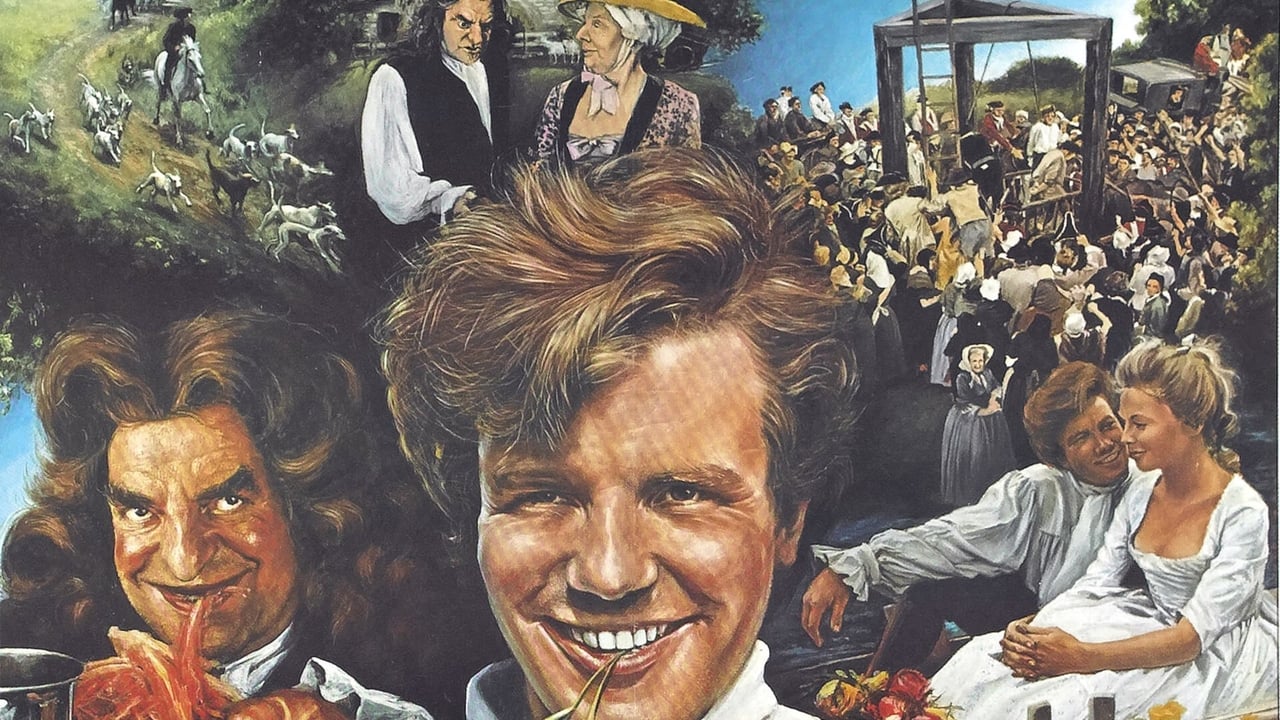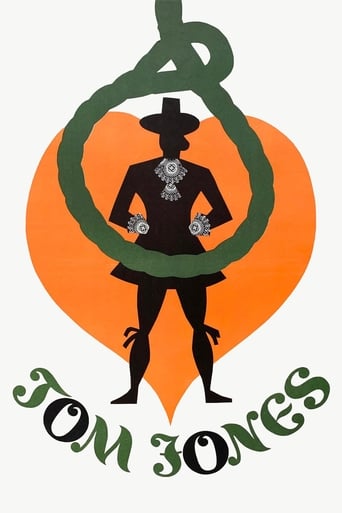

British New Wave practitioner Tony Richardson's rumbustious Oscar BEST PICTURE champ has been degraded to something of a damp squib half an century later since its triumph is deemed as "unworthy" by general opinion, in IMDB it holds a 6.7/10, quite a nadir for a redoubtable title-holder. But if a viewer gives it a try with this scrumptiously restored Blu-Ray edition (retrofitted with Dolby Stereo), the consensus is, at the very least, a resplendent period treat enveloped with ample, lilting, euphonious selections to please one's ears and a carefree comedy-of-errors as much beholden to a unique faux-naïf whiff of British nobility as to its often vacuous, non-sensical happenings, which are transmuted from Henry Fielding's 18th century source novel THE HISTORY OF TOM JONES, A FOUNDLING.Our young hero Tom Jones (Finney), whose parentage is the film's best kept secret, is a foundling adopted by Squire Allworthy (Devine), in due time he wins the heart of the young lady Sophie Western (York) with his chivalry, but also has no qualms about copping off with a luscious Molly Seagrim (Cilento), the daughter of a local peasant, and even gallantly defends her names on the back of his black horse, an atypical knight-in-the-shining-armor, the truth is, Tom is a magnetized draw toward the opposite site, which the film flogs to death through the mouths of his many a female admirer, but as fresh-faced as he is, Finney's dreamboat quotient is not potent enough, his appearance often betrays a tinge of sophistication which will mature tangibly with time, ergo, it becomes slightly vexing in this nominal "female gaze" outlook that tapers into frivolity, once Tom sets his foot on his own to explore the world. On the one hand, it looks bizarre now, that the film holds an unmatched record by securing three Oscar nominations in BEST SUPPORTING ACTRESS category (with no win though), granted that the film does present a menagerie of vivacious, delicious and colorful personages: a transmogrified Cilento is a brazen sight to behold; Dame Edith Evans is right on the nose as Sophie's spinster aunt, a moralistic do-gooder cannot be bothered even by a pistol-wielding footpad; Joyce Redman makes splashes with her infamous duet with Finney in their food partaking flirtation as Mrs. Waters, and is spared with an incestuous scandal in the final reveal, apart from those aforementioned three Oscar-nominated ladies, a Golden Globe-nominated Joan Greenwood doesn't cede her reign to anyone else as the amoral Lady Bellaston, but in the event, every character, including the bibulous luvvie Hugh Griffith as Sophie's fatuous father, David Warner's vicious turn in his screen debut and a scene-stealing David Tomlinson as Lord Fellamar who is blatantly ready to ravish his object of desire, even the two leads Tom and Sophie, is wanting of a magic potion which would lend them some substance other than a caricature or a skin-deep nonentity. On the other hand, Richardson maxes out his aptitude to marshal this picture into a resounding spectacle other than the usual suspect of a knockabout ruckus, from its beguiling silent skit opening to the sweeping grandness of a deer hunting hoopla, and to the riveting sword fights, to say nothing of its opulent decorations and garments, one must hand it to him for his audacity and faculty in burnishing this episodic shaggy-dog story as integral as it could be, notwithstanding the shark-jumping ending is visibly rushed, and that final illegitimate-status-to-noble-extraction volte-face is such a conformable device rightfully harking back to the novel's antediluvian provenance.
... View MoreCountry England, early 1700s. Squire Allworthy, a wealthy landowner, adopts a baby whose mother is a servant in his house and whose father is unknown. That baby is Tom Jones. Many years later and Tom is now a young, handsome man. He has a lust for life, and for Molly Seagrim, the gamekeeper's daughter. She, however, is now pregnant and the father could be anyone, including Tom. Tom's affections are now directed towards Sophie Western, the daughter of the neighbouring landowner. They fall in love, but her father won't have a bar of the relationship. Tom ends up banished from the estate. He sets off for London. Many adventures and much drama await him.Started well. There was a lightness and exuberance to the film that carried it along and it had the potential to be a great comedic look at the lives of the landed gentry. I kept waiting for it to click into top gear and let the humour flow.Yet it never really came. The set up was often there but the writer and director pulled their punches. From a point it just degenerated into silly farce, Carry On-like.It has its moments but these are few and far between. These moments do serve to remind you how good the movie could have been. They also make the movie quite uneven, as you have these highs, making you think that the film has at last kicked up a notch, only to go back to the mediocrity that came before.Somehow this movie won the Best Picture Oscar in 1964. Must have been a lean year for good movies and, looking at the other contenders, clearly it was.
... View MoreI managed to get into the theatre to see "Tom Jones" when I was a tender 16-year-old (the film got an "R" rating in Ontario). It was and remains at the zenith of my movie-going experiences. The theatre was packed and the reaction of the audience to the movie gives new meaning to the words "guffawing" and "rolling in the aisles" and "rollicking"."Tom Jones" came out at the height of the British New Wave. It eschews impeccably grand and fussy shots of stately mansions and serene crowds in favour of wildness and chaos. It plunks the camera in the mud with the pigs, plays peek-a-boo with the ladies' bosoms (the elderly Dame Edith Evans, thwacking the hogs with her parasol, her own breasts seemingly in danger of popping out of her bodice, is a sight to behold!), and completely thwarts our expectations of how a period piece should play. Masterpiece Theatre this is not. I doubt that Tony Richardson ever made a better - or more robust - movie.Yet, in spite of its satirical bent, there's not a mean bone in its body. It displays the ugliness, dangers and unfairness of the society it's portraying (I noticed, at the time, that British cinema was largely about class), but "Tom Jones" won my heart because it does so much more. It's full of joy, hope and optimism, and it's a celebration of love, life and youth. It makes me feel young again.
... View MoreAfter a wonderful 'silent movie' prologue in which the 18th Century Squire of Western England accepts custody of an illegitimate baby boy--"born to be hanged"--this hoked-up variation on Henry Fiedling's novel moves in fit and starts, the product of a poor direction which was then aided by feverish editing. Albert Finney's Tom falls for the Squire's comely daughter (a pensively ravishing Susannah York) but is prevented from marrying her due to his questionable heritage; he hits the road after his beloved is promised to another man, becoming involved in sword-fights, infidelities, and assorted promiscuities. Certain set-pieces (a rowdy, savage deer hunt, a seduction/dinner sequence at the inn, a courtship amongst the blossoms) have become legendary--and for good reason. The picture is smashing to look at (as photographed by Walter Lassally), though the movie-narrative is squashy and the character of Tom Jones is a bit of a sod (Finney brings charisma to the part, but he does more for the enterprise than it does for him). The winner of four Academy Awards (including Best Picture!), the film is usually described as 'lusty' or 'bawdy', but the development of the many assorted characters is poor, the smirking overall tone is tiresome, and the general heart of the piece becomes lost in the morass. ** from ****
... View More